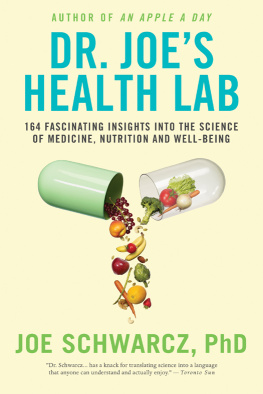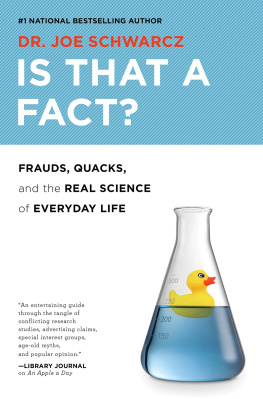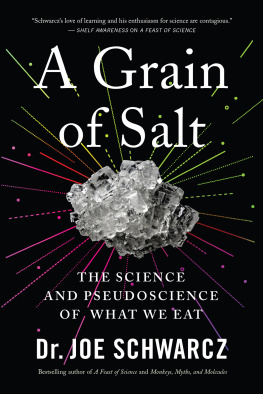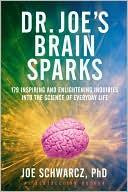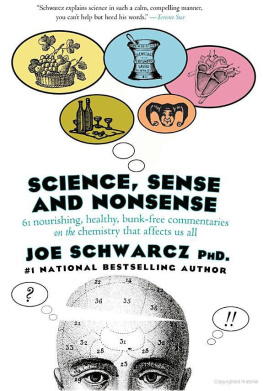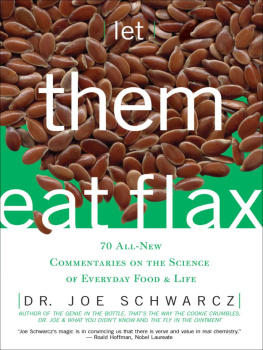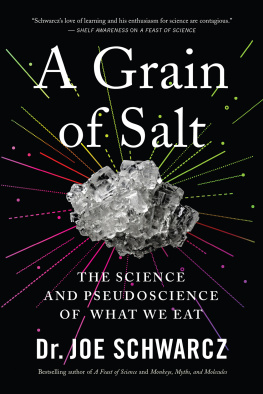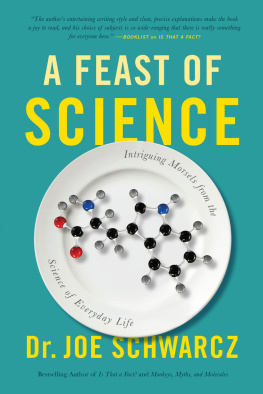Joe Schwarcz - Dr. Joes Health Lab: 164 Amazing Insights Into the Science of Medicine, Nutrition and Well-being
Here you can read online Joe Schwarcz - Dr. Joes Health Lab: 164 Amazing Insights Into the Science of Medicine, Nutrition and Well-being full text of the book (entire story) in english for free. Download pdf and epub, get meaning, cover and reviews about this ebook. year: 2011, publisher: Doubleday Canada, genre: Romance novel. Description of the work, (preface) as well as reviews are available. Best literature library LitArk.com created for fans of good reading and offers a wide selection of genres:
Romance novel
Science fiction
Adventure
Detective
Science
History
Home and family
Prose
Art
Politics
Computer
Non-fiction
Religion
Business
Children
Humor
Choose a favorite category and find really read worthwhile books. Enjoy immersion in the world of imagination, feel the emotions of the characters or learn something new for yourself, make an fascinating discovery.
- Book:Dr. Joes Health Lab: 164 Amazing Insights Into the Science of Medicine, Nutrition and Well-being
- Author:
- Publisher:Doubleday Canada
- Genre:
- Year:2011
- Rating:3 / 5
- Favourites:Add to favourites
- Your mark:
- 60
- 1
- 2
- 3
- 4
- 5
Dr. Joes Health Lab: 164 Amazing Insights Into the Science of Medicine, Nutrition and Well-being: summary, description and annotation
We offer to read an annotation, description, summary or preface (depends on what the author of the book "Dr. Joes Health Lab: 164 Amazing Insights Into the Science of Medicine, Nutrition and Well-being" wrote himself). If you haven't found the necessary information about the book — write in the comments, we will try to find it.
Joe Schwarcz: author's other books
Who wrote Dr. Joes Health Lab: 164 Amazing Insights Into the Science of Medicine, Nutrition and Well-being? Find out the surname, the name of the author of the book and a list of all author's works by series.
Dr. Joes Health Lab: 164 Amazing Insights Into the Science of Medicine, Nutrition and Well-being — read online for free the complete book (whole text) full work
Below is the text of the book, divided by pages. System saving the place of the last page read, allows you to conveniently read the book "Dr. Joes Health Lab: 164 Amazing Insights Into the Science of Medicine, Nutrition and Well-being" online for free, without having to search again every time where you left off. Put a bookmark, and you can go to the page where you finished reading at any time.
Font size:
Interval:
Bookmark:
By the Same Author
Brain Fuel
Science, Sense and Nonsense
Dr. Joes Brain Sparks

SUPPLEMENTS

The traditional answer is to lower your cholesterol. But there is accumulating evidence that this form of soluble fibrefound, for example, in oat brancan perk up our immune system. Fibre is the indigestible part of the oat grain, meaning that it isnt broken down into components that can be absorbed into the bloodstream. So if it isnt absorbed, how can it have an effect on blood cholesterol? As beta-glucan travels through the digestive system, it binds bile acidscompounds synthesized in the liver and then secreted into the small intestine to aid in the processing of dietary fats. These bile acids are usually reabsorbed and recycled. But when they are bound by beta-glucan, they end up being eliminated from the body and therefore have to be replaced. This means that the liver has to make fresh bile acids, and since the raw material for this synthesis is cholesterol, the result is that blood cholesterol levels drop.
Theres a second mechanism that operates as well. Bacteria that live in the large colon recognize beta-glucan as a tasty morsel. As they dine on it, they excrete compounds called short chain fatty acids that are absorbed into the bloodstream. Short chain fatty acids can impair cholesterol synthesis, so the liver has to use existing cholesterol to make bile acids. The problem, though, is that it takes a fair bit, about five to six grams, to trigger a significant lowering of cholesterol levels. That translates to a lot of oat branabout three servings, quite a challenge. But beta-glucan is also available as a dietary supplement, and interestingly may serve a purpose beyond just lowering cholesterol, even at a reduced intake.
Over the last thirty or so years, beta-glucan has received a lot of attention from researchers because of its purported ability to activate the immune system. Certain immune cells recognize invaders such as yeasts, fungi and bacteria by the polysaccharides they harbour on their surface. When the immune cells sense these compounds, they are activated to attack the intruders. Beta-glucan is a polysaccharide composed of glucose units linked together in a chain similar to that found in microbes. When immune cells encounter beta-glucan in the bloodstream, they are tricked into greater activity, mistaking beta-glucan for microbial polysaccharides. These activated cells then go and seek out invaders that they otherwise may not have found.
Macrophages, for example, are white blood cells that destroy invaders by engulfing them and pummelling them with chemicals that break them down. But first they have to be activated. Beta-glucan can do this by binding to their surface and stimulating the production of free radicals. These in turn signal the immune cells to engulf and destroy intruders such as bacteria, viruses and even tumour cells. Studies have shown that beta-glucan can reduce postoperative infections after high-risk surgery, and studies in mice have shown that animals treated with beta-glucan have a higher survival rate when injected with aggressive tumour cells.
In Japan, a beta-glucan preparation known as Lentinan, isolated from the shiitake mushroom, is used as an intravenous adjuvant to chemotherapy. Shiitake mushrooms themselves have a long folkloric history of use against infections of all types, including the common cold. Experiments have shown that shiitake promotes the production of interleukin, a hormone that stimulates the immune system to produce B-cells that create antibodies as well as helper T-cells that coordinate the immune response. So far, though, evidence of any sort of practical immune boost by taking oral supplements of beta-glucan is pretty thin, and the European Food Safety Authority has recently turned down an application by a German beta-glucan producer for a label claim of improving the bodys immune system against the common cold because of insufficient evidence. The jury on beta-glucan supplements is still out, but in the meantime, do keep eating your oat bran for breakfast.

That vitamin C is an antioxidant. Vitamin C (ascorbic acid) reduces elemental iodine (I2) to iodide (I) by providing electrons. In chemical terms, this is called a reduction. Reduction is the opposite of oxidation, hence the expression antioxidant to describe the action of vitamin C. In practical terms, this means that vitamin C has the ability to donate electrons to free radicals and neutralize their effect. Free radicals have been linked with various disease processes.

These three animals (the bulbul is a bird), like man, require a source of vitamin C in their diet. Most animals can biosynthesize vitamin C and can live happily without its presence in the diet. Primates, of course, cannot make it and must have a dietary supply. The main role of vitamin C is to prevent scurvy, but we do not need very much to do this. About 10 milligrams a day is sufficient. But a higher intake of vitamin C is appropriate because of its anti-oxidant effect.

Glucosamine is a popular over-the-counter treatment for osteoarthritis, a painful condition associated with the deterioration of cartilage, the flexible connective tissue that cushions the joints between bones. When cartilage wears away, bone painfully rubs on bone. The idea of using glucosamine to treat osteoarthritis stems from the observation that glucosamine formed naturally in the body is the precursor for the biosynthesis of glycosaminoglycans, major components of cartilage. Perhaps supplementing the bodys supply of glucosamine would help repair cartilage, the thinking went.
But thinking, even if scientifically rational, is not evidence. And this is where we run into difficulties with glucosamine. While some early studies showed a benefit, more recent, larger and better controlled trials have failed to live up to the original optimism. Glucosamine comes in two possible forms, the sulphate or the hydrochloride. The hydrochloride actually yields more glucosamine in the body, but practically speaking, the difference is not much. Low-back pain can often be caused by osteoarthritis, and glucosamine supplements are widely promoted for this condition.
A placebo-controlled study using 1,500 milligrams of glucosamine sulphate showed no difference between the experimental and the placebo groups, but both groups did show some improvement. Results seem to be somewhat better when glucosamine is combined with chondroitin, a substance isolated from pig or cow cartilage. It is thought to improve the elasticity of cartilage and to inhibit enzymes that break it down. This combination helps to ease moderate to severe knee pain in osteoarthritis patients, but is not useful for mild pain.
Next pageFont size:
Interval:
Bookmark:
Similar books «Dr. Joes Health Lab: 164 Amazing Insights Into the Science of Medicine, Nutrition and Well-being»
Look at similar books to Dr. Joes Health Lab: 164 Amazing Insights Into the Science of Medicine, Nutrition and Well-being. We have selected literature similar in name and meaning in the hope of providing readers with more options to find new, interesting, not yet read works.
Discussion, reviews of the book Dr. Joes Health Lab: 164 Amazing Insights Into the Science of Medicine, Nutrition and Well-being and just readers' own opinions. Leave your comments, write what you think about the work, its meaning or the main characters. Specify what exactly you liked and what you didn't like, and why you think so.

